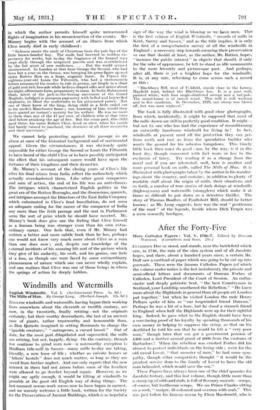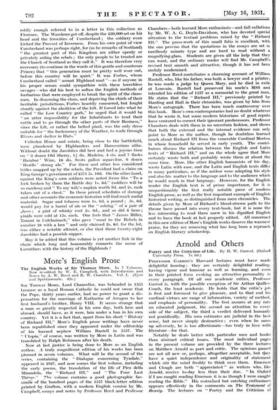After the Forty-Five
More Culloden Papers : Vol. V, 1746-7. Edited by Duncan Warrand. (Carruthers and Sons. 21s.) CULLODEN HOUSE stood, and stands, near the battlefield which saw, in 174.6, the ruin of the clan system and of all Jacobite hopes, and there, about a hundred years since, a certain Mr. Duff saw a eartload of paper which was going to be cut up into gunwads. These were the famous Culloden Papers (of which the volume under notice is the last instalment), the private and- semi-official letters and documents of Duncan Forbes of Culloden, Lord President of the Court of Session. An enthu- siastic and deeply patriotic Scot, " the best Countryman in Scotland, your Lordship smothered the Rebellion." " He knew more about the Highlands in general than all people att London put together," but when he visited London the rude Henry Pelham spoke of him as "our longwinded friend Duncan." Perhaps he was a bit of a bore, but he stood a staunch friend to England when half the Highlands were up for their rightful king. Indeed, he gave what to the English should have been a convincing proof of his loyalty by spending thousands of his own money in helping to suppress the rising, so that on his deathbed he told his son that lie would be left a very poor man," though later that son got a government pension of £400 and a further annual grant of £600 from the customs of Barbadoes ! When the rebellion was crushed Forbes did his Utmost to protect individuals on the losing side ; even for the old rascal Lovat, " that monster of men," he had some sym- pathy, though other compatriots thought it would be the greatest service done to the family of Lovat to have the old man beheaded, which would save the son."
• These Papers have always been one of the chief quarries for Jacobite history, and this last volume, though little more than a sweep-up of odds and ends, is full of flavoury morsels—scraps, of course, but toothsomescraps. We see Prince Charles sitting °Oa rock, " maigre, ill-coloured and overrun with scab." This was jtist before his famOui rescue by Flora Macdonald, who is
oddly enough referred to in a letter in this collection. as Florence. The Wanderer got off, despite the £30,000 set on his head and the ferocities of Cumberland ; the soldiery even kicked the Provost of Inverness. From his own point of view Cumberland was perhaps right, for (as he remarks of Scotland) " the greatest part of this Kingdom are either openly or privately aiding the rebels ; the only people to be trusted are the Church of Scotland as they call it." . It was therefore very necessary (to continue in the words of this gentle and courteous Prince) that " this generation must be pretty well wore out, before this country will be . quiet." It was . Forbes, whom Cumberland called " arrant Highland mad "—as if anyone in his proper senses could sympathise with these breechless savages—who did his best to soften the English methods of barbarism that were employed to break the spirit of the clans- men. In disarming the clans, and depriving the chiefs of their heritable jurisdictions, Forbes heartily concurred, but fought stoutly against, the abolition of the kilt. If forced into what he called " the Low Country garb," he urged that it would be " an utter impossibility for the Inhabitants to tend their cattle and to go through the other parts of their Business," since the kilt, or rather the belted plaid, was the only dress suitable for " the Inclemency of the Weather, to wade through Rivers and shelter in Huts."
Culloden House and estate, being close to the battlefield, were plundered by Highlanders and Hanoverians alike. Without doubt the Jacobites did best and had a joyous time on 3 dozen Old Sherry, 11 do. Madeira, 4 do. and 7 flasks Barabar ' Wine, 16 do. Scots gallon aquavitae, 6 dozen Bowlls ' strong ale." For these and other less considered trifles snapped up by the rebels, the President had a claim on King George's government of .2571 5s. 10d. On the other hand, against the King's own soldiers were noted items like "To a lock broken by them the Battle day ls. 6d." (soldiers will be so careless) and " To my wife's napkin worth 9d. and 2s. cash taken out of a chest." In these priced schedules of damage and other accounts the economic historian will find much useful material. Sugar and tobacco were ls. Gd. a pound ; .3s. 6d. would pay for a barrel of ale or the " soleing " of a pair of shoes ; a pint of whisky cost 2s. Gd., and so did 6 hens ; plaids were sold at 15s. each. One feels that James Miller, ',Conant in Culchuinach," who gave :" meat to the Rebels in number 28 with a hen " and only claimed 2s. 8d. for the lot, was either a notable altruist, or else that those twenty-eight Jacobites had a poorish supper.
May it be added that this volume is yet another link in the chain which long and honourably connects the name of Carruthers with the history of the Highlands ?



















































 Previous page
Previous page